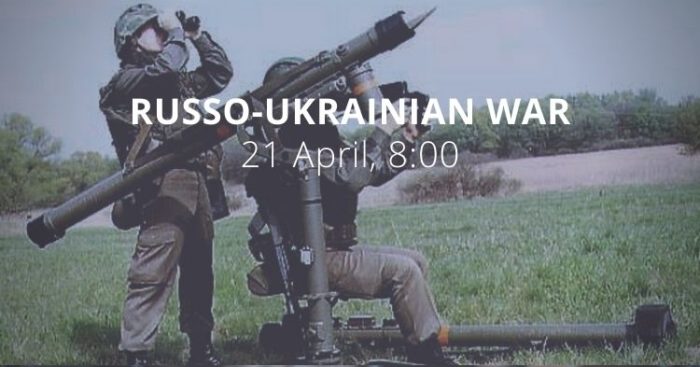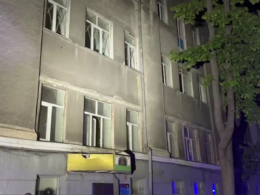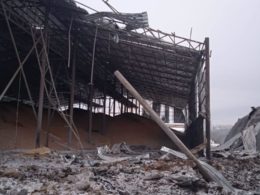Drones attack Moscow, hitting building of three Russian ministries. Pope calls on Russian “brothers” to restore Black Sea grain deal – Vatican News. Fencing federation reinstates distanced greetings following Kharlan uproar.
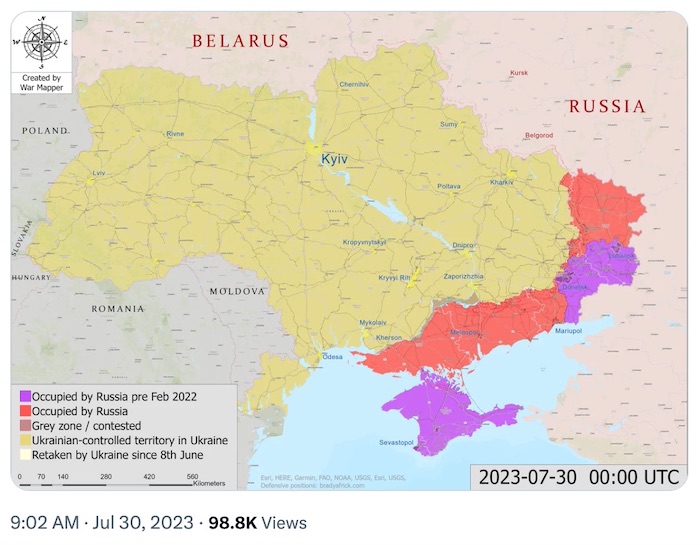
Daily overview — =Summary report, July 31
According to information from the General Staff as of 06.00 31.07.2023, supplemented by its [18:00 assessment].
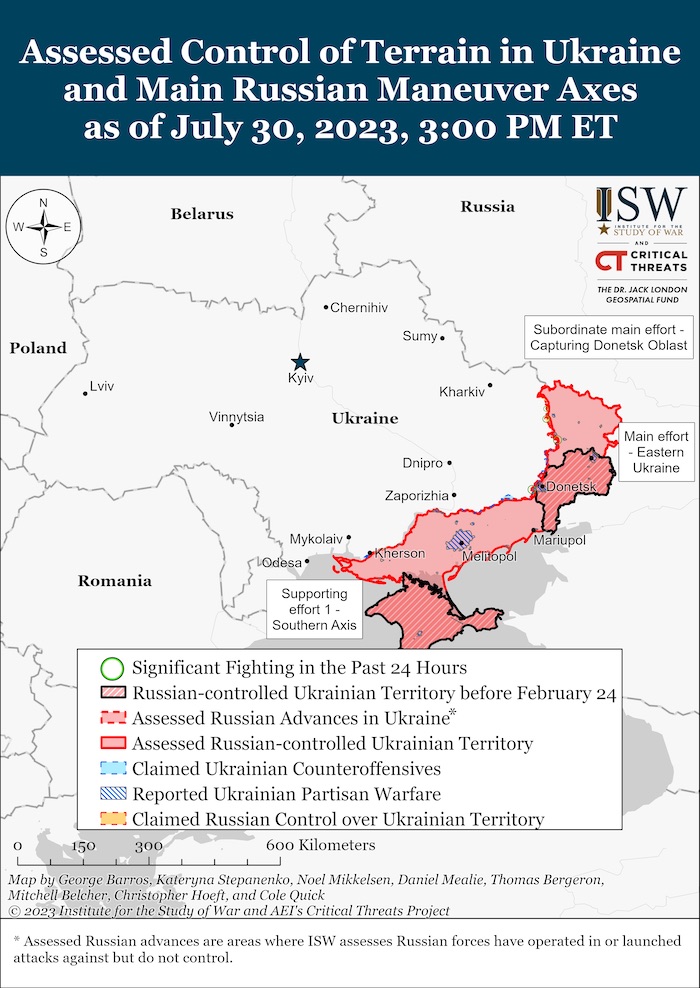


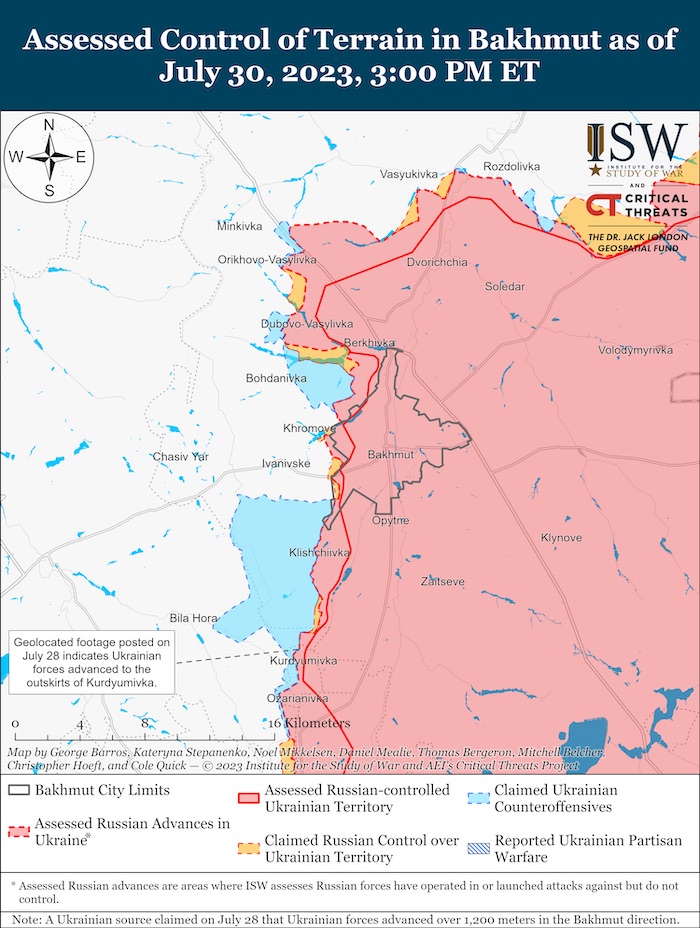
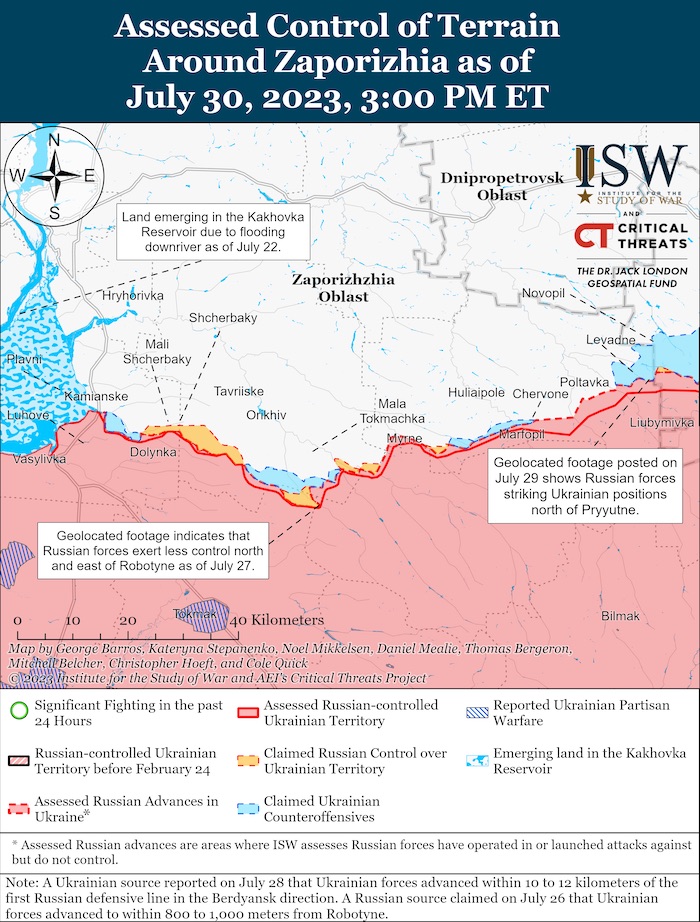

Military Updates

Ukrainian resistance adapts to key role in the counteroffensive. On July 19, the Ukrainian Armed Forces conducted a strike on a Russian ammunition depot in Crimea. Later, Major General Kyrylo Budanov, head of the Defense Intelligence Unit of Ukraine, confirmed the strike, calling it a “successful operation.” In his comments, he also thanked the “Ukrainian patriots” in Crimea for the additional intelligence and confirmation videos that were critical to the operation. Previously, Ukrainian intelligence and other branches of the armed forces had repeatedly urged those Ukrainians in the temporarily occupied territories to help in liberating these regions by providing information on enemy forces via specifically designated Telegram channels.
Ukraine reports strike on Chonhar bridge, connecting Crimea with southern Ukraine. Chonhar connects occupied Crimea with the Zaporizhzhia Oblast, where Ukraine is conducting its counteroffensive.
According to British Defence Intelligence, (last 48 hours):
https://twitter.com/DefenceHQ/status/1684843715683037184
- The Russian authorities are prioritizing amending legislation to allow more men to be rapidly drafted into the military. In mid-July 2023, the State Duma increased the maximum age of liability for conscription from 27 to 30, while retaining the current lower limit at 18. While conscripts are not currently deployed in Ukraine, extra draftees free-up professional and mobilised soldiers from other duties inside Russia.
- On 24 July 2023, President Putin signed a bill which will gradually increase the upper age limit for those liable for call up as reservists: senior officers can now be mobilised up to 70. Reservists made up the Autumn 2022 ‘partial mobilisation’ and could provide a more immediate boost to the number available to fight in Ukraine.
- The increased chance of being compelled to fight, drone attacks on Moscow, exceptional level of domestic repression, and the recent Wagner mutiny combine to highlight the Russian state’s failure to insulate the population from the war.
Losses of the Russian army
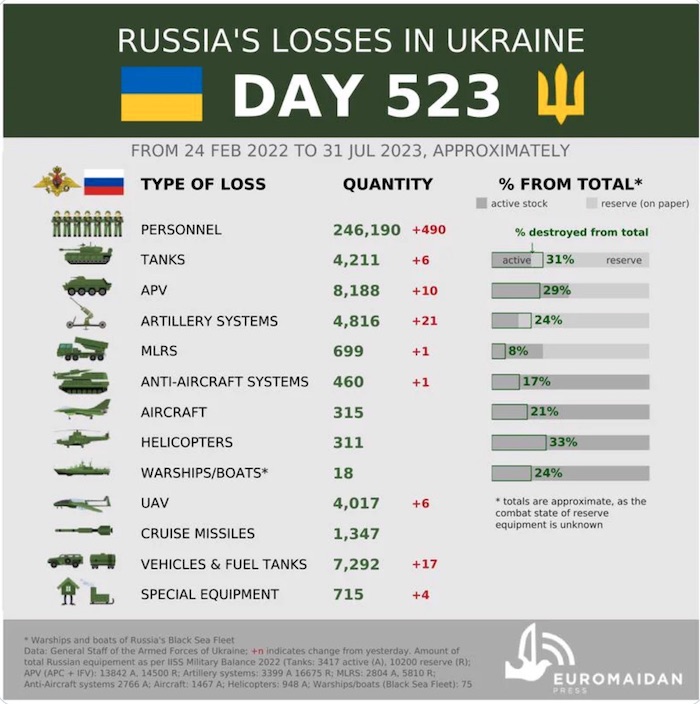
Humanitarian
Russia’s war has left many Ukrainians vulnerable to human trafficking – ombudsman. Russia’s war has created new human trafficking risks for Ukrainians, Human Rights Commissioner of the Verkhovna Rada of Ukraine Dmytro Lubinets says. According to him, forced deportation of civilians to Russia, internal displacement, and the fact that many Ukrainians seek shelter from the war abroad have made the population more vulnerable to trafficking. Earlier, the Prosecutor General’s office informed that 56 citizens became victims of human trafficking in 2023.
Three civilians killed in Russian attacks on nine oblasts of Ukraine in a single day. Russian occupiers attacked nine regions of Ukraine in a single day, including Chernihiv, Sumy, Zaporizhzhia, Kharkiv, Luhansk, Donetsk, Kherson, Mykolaiv, and Dnipropetrovsk Oblasts with mortars and artillery, according to the regional military administrations. On 29 July, the Russian missile attack on Zaporizhzhia killed a 32-year-old woman and a 45-year-old man and injured two people. In addition, Russian troops shelled Zaporizhzhia Oblast with artillery and used drones to target 20 settlements in the region, as per Ukrainska Pravda.
Ukraine’s manpower requirements reaching critical threshold. Following Ukraine’s successful Kherson counteroffensive in the fall of 2022, the war in Ukraine has moved into the Materialschlacht, or war of attrition phase, which is rapidly depleting critical resources. Typically, when discussing resources in this sense, Ukraine is most often referring to the tanks, missiles, ammunition, and other materiel that it needs from its partner countries. However, human or personnel resources are often overlooked. According to classified and partially open-source data, as of 1 January 2022, the population of Ukraine was 31 million, while the State Statistics Service of Ukraine reports 34 million, though there are problems with the methodology used to arrive at this number. The population dropping from 48 million to 31 million in 20 years is normal, especially as Ukraine has experienced multiple crises and outmigration waves during that period. According to Eurostat, approximately 4.9 million Ukrainians received residence permits in the European Union alone between 2014 and 2022 and approximately 3 million did so in Russia. Subtracting from this figure the number of Ukrainians in the occupied territories (approximately 2 million), as well as those who left the country, the current estimate for Ukraine’s population comes to around 20 million.
Russians abducted 250 children from occupied Melitopol, adopting them to “new families” in Russia – authorities. Russians kidnaped 250 children from occupied Melitopol, Zaporizhzhia Oblast, likely to adopt them to “new families” in Russia, Melitopol Mayor Ivan Fedorov reported. “The enemy stole 250 children from the temporarily occupied territory and allegedly found them ‘new families’ in Russia. It will be difficult to return these children after de-occupation,” Fedorov said. According to the mayor, Russians took about 1,000 Ukrainian children from the occupied part of Zaporizhzhia Oblast to camps, allegedly for rehabilitation. “However, we clearly understand that this “vacation” is not about recovery, but about propaganda,” Fedorov noted.
Environmental
Pope calls on Russian “brothers” to restore Black Sea grain deal – Vatican News.
On 30 July, Pope Francis called on Russia to reverse its decision to abandon the United Nations-brokered deal allowing Ukraine to export grain blocked in the Black Sea ports by occupation troops, according to Vatican News. “I appeal to my brothers, the authorities of the Russian Federation, that the Black Sea Initiative may be restored and grain may be transported safely,” he said at the conclusion of the Sunday Angelus. On 17 July, Kremlin spokesman Dmitry Peskov announced Russia’s suspension of the Black Sea grain agreement, signed in the summer of 2022 to unblock the export of Ukrainian grain.
Support
Fencing federation reinstates distanced greetings following Kharlan uproar. The International Fencing Federation decided fencers can resume distanced greetings instead of shaking hands, after an incident pitting Ukrainian Olga Kharlan against a Russian foe created an uproar.
New developments
Ukraine, US to begin talks on security guarantees next week – Presidential Office. Ukraine will begin talks with the US on a bilateral agreement for security guarantees as early as next week, Head of the President’s Office Andrii Yermak says. “These guarantees will remain in effect until Ukraine becomes a member of NATO, which is the most reliable security guarantee,” he explains.
Drones attack Moscow, hitting building of three Russian ministries. On 30 July, three drones attacked Moscow, hitting a building housing the Russian Ministry of Economic Development, Ministry of Industry and Trade, Ministry of Digital Development, Communications and Mass Media.
Assessment
- On the War
The Institute for the Study of War has made the following assessment as of 30 July:
The lack of Russian milblogger reaction to a Ukrainian strike on the Chonhar bridge represents a notable inflection in Russian reporting on the war in Ukraine and may suggest that the Kremlin has directed Russian milbloggers to refrain from covering certain topics. The Ukrainian Armed Forces announced on July 29 that Ukrainian forces successfully struck the Chonhar bridge on the M-18 (Dzhankoi-Melitopol) highway between occupied Crimea and occupied Kherson Oblast.[1] ISW has not observed any Russian milblogger discussion about the Ukrainian strike or Russian milbloggers promoting Kherson Oblast occupation administration head Vladimir Saldo’s claim that Russian forces intercepted 12 Ukrainian Strom Shadow cruise missiles targeting the bridge.[2] The only other Russian source to comment on the strikes was a local Russian news Telegram channel, which amplified alleged claims from Russian tourists in the area about the bridge being closed to traffic.[3] Russian milbloggers responded to a Ukrainian strike on the Chonhar bridge on June 22 with widespread outrage and concern, and Russian milbloggers routinely comment on both successful and allegedly unsuccessful Ukrainian strikes on Russian logistics.[4] The Chonhar bridge is a notable bottleneck along a critical Russian ground line of communication (GLOC), and it is highly unlikely that Russian milbloggers would voluntarily ignore a successful or unsuccessful Ukrainian strike on the bridge. ISW has previously assessed that select Russian milbloggers may be shaping their coverage of the war in Ukraine in ways more favorable to Kremlin narratives out of fear of Kremlin punishment following the removal of prominent critical voices in the Russian information space, particularly pro-war critic Igor Girkin and Wagner Group financier Yevgeny Prigozhin.[5] General fear of Kremlin punishment would not likely result in such near-universal lack of coverage of a dramatic event, however, and it is more likely that a specific Kremlin directive not to cover disruptions to critical GLOCs caused this lack of reporting.
Russian President Vladimir Putin disingenuously framed the ongoing Ukrainian counteroffensive as inhibiting prospects for negotiations. During a press conference at the Russia-Africa Summit on July 29, Putin accused Ukraine of launching a large-scale offensive so that Russia cannot discuss a ceasefire while its troops are defending against Ukrainian attacks.[6] Russian officials have previously weaponized the mention of negotiations in order to accuse Ukraine of being the party unwilling to enter into negotiations discussions, and Putin is likely using discussions of the Ukrainian counteroffensive to undermine reports of Ukrainian battlefield successes and accuse Ukraine of continued lack of interest in a potential negotiations process.[7] Russian forces have been conducting their own attacks in Luhansk and around Donetsk City almost continuously since before the Ukrainian counter-offensive began, moreover, a fact that Putin did not, naturally, mention. Putin also notably lauded the work of Central Military district Commander Lieutenant General Andrey Mordvichev for repelling Ukrainian attacks and securing advances, likely in Luhansk Oblast.[8]
Ukrainian forces conducted counteroffensive operations on at least three sectors of the front and made claimed advances in some areas. Ukrainian military sources reported that Ukrainian forces are achieving small successes on the southern flank of Bakhmut and are gradually advancing in the Berdiansk (western Donetsk-eastern Zaporizhzhia Oblast area) and Melitopol (in western Zaporizhzhia Oblast) directions.[9]
Key Takeaways:
- The lack of Russian milblogger reaction to a Ukrainian strike on the Chonhar bridge represents a notable inflection in Russian reporting on the war in Ukraine and may suggest that the Kremlin has directed Russian milbloggers to refrain from covering certain topics.
- Russian President Vladimir Putin disingenuously framed the ongoing Ukrainian counteroffensive as inhibiting prospects for negotiations.
- Ukrainian forces conducted counteroffensive operations on at least three sectors of the front and made claimed advances in some areas.
- Russian forces conducted offensive operations along the Svatove-Kremina and Avdiivka-Donetsk City lines and did not make any confirmed gains in these areas.
- Ukrainian forces conducted offensive operations southwest and northwest of Bakhmut and made claimed gains in this direction.
- Ukrainian forces continued offensive operations in western Donetsk Oblast and western Zaporizhzhia Oblast and made claimed marginal advances.
- Russian sources claimed that Russian forces counterattacked and regained lost positions in western Donetsk and western Zaporizhzhia oblasts.
- Russian sources claimed that Russian officials plan to regulate civilian volunteers who take supplies to Russian forces in Ukraine.
- Ukrainian partisans reportedly sabotaged Russian military equipment in occupied Mariupol, Donetsk Oblast on July 29.


